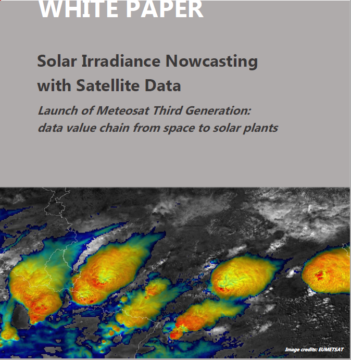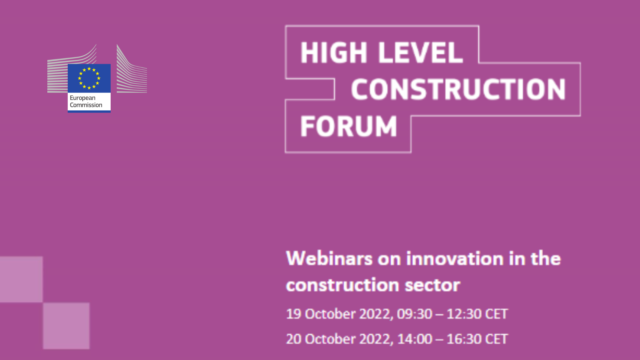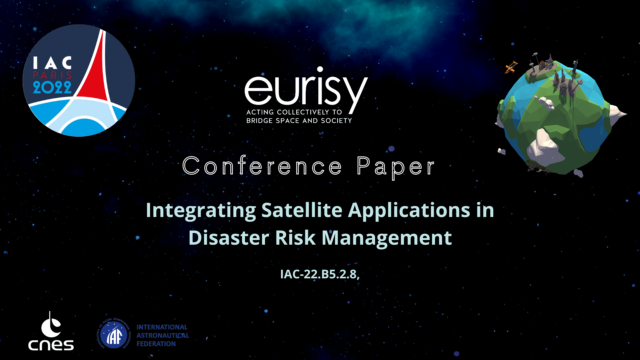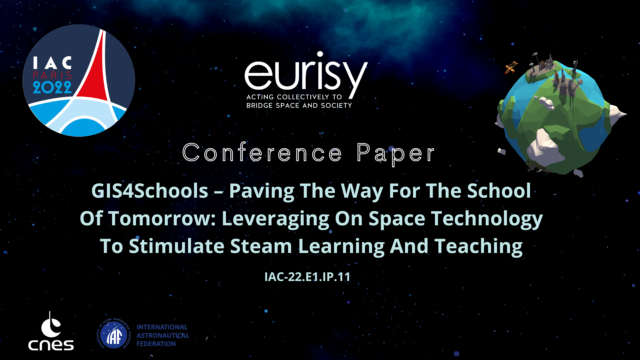74th International Astronautical Congress (IAC), Baku, Azerbaijan. Paper: “Protecting Europe: How can space applications support European states toimplement the new Critical Entities Resilience Directive”
 In this white paper, contributors Mathieu Turpin (Reuniwatt), Pilar Rípodas (AEMET) and Jochen Grandell (EUMETSAT) present the journey of satellite data from space to solar plant, following the launch of the Meteosat Third Generation Imager-1 (MTG-I1) – the first of a new generation of satellites providing crucial insights for the early detection and prediction of fast-developing severe storms, weather forecasting and climate monitoring.
In this white paper, contributors Mathieu Turpin (Reuniwatt), Pilar Rípodas (AEMET) and Jochen Grandell (EUMETSAT) present the journey of satellite data from space to solar plant, following the launch of the Meteosat Third Generation Imager-1 (MTG-I1) – the first of a new generation of satellites providing crucial insights for the early detection and prediction of fast-developing severe storms, weather forecasting and climate monitoring.
This white paper highlights the accomplishments achieved through MTG characteristics, as well as the positive impact of the additional datasets and their improved quality and accuracy in solar irradiance forecasts in particular.

On the 19 and 20 of October 2022, the High Level Construction Forum organised two webinars that
aimed to identify technologies that have the potential to advance the digital and green transition of
the construction ecosystem. It initiated an exchange on challenges and needs regarding research and
innovation, the uptake of technologies and the transfer of technology from research to market.

In recent years, Europe faced the consequences of several natural hazards, resulting in human and economic losses.
Extreme weather events due to climate change will only increase in the future. The rapid growth in the use of
satellite applications has the potential to mitigate the impact of climate change and related hazards. Earth
observations, Global Navigation Satellite Systems, and satellite communications all support crucial phases of
disaster risk management, from prevention and preparedness to response and recovery.
This paper aims to shed light on the European stakeholders playing a role in the disaster risk management cycle
and the contributions of satellite applications. It revolves around the current mechanisms to access and share
international and European space-born information. An analysis of the main stakeholders will be provided, as well
as their role and operative mechanisms. The research seeks to deepen the disaster risk management community
among European states with regard to the integration of satellite applications. Several recent case studies on the
use of satellite-based services during different disasters will be presented.

Meeting the demand for STEAM skills in the job market is considered a priority in the European Union. The concerns related to the supply of STEAM skills rely on the educational offers from secondary schools and the propensity of pupils to follow a scientific course of study at the university level. Across Europe, every country is responsible for the definition and development of its methodological approach to enhance the teaching and learning of STEAM subjects. Because of its inspirational power, space can play a relevant role in attracting the young generation towards STEAM disciplines. Multiple projects have been developed at the European level to facilitate the familiarisation of pupils with STEAM topics by using space in combination with crucial challenges, such as climate change. An example of a project with such an objective is the Erasmus+ “GIS4Schools”. The project aims to improve STEAM learning paths in secondary schools, by promoting an innovative approach to the teaching of scientific subjects, while introducing the teaching of GIS and EO applied to the topic of climate change.
This paper is conceived as a follow-up of last year’s introduction to the GIS4Schools project to the global audience of the IAC. Leveraging in-depth interviews with the schools involved in the project and the data collected through the Digital Diaries, the paper will provide an analysis of the skills acquired by the pupils in the first half of GIS4Schools. In particular, the analysis will help to understand if the GIS4Schools products, as the Training Handbook and the use cases developed by each school, can constitute an autonomous teaching module to be integrated into existing teaching curricula. By retracing the latest developments of the GIS4Schools project, the paper will present the project as a case study for the development of future initiatives on the topic.